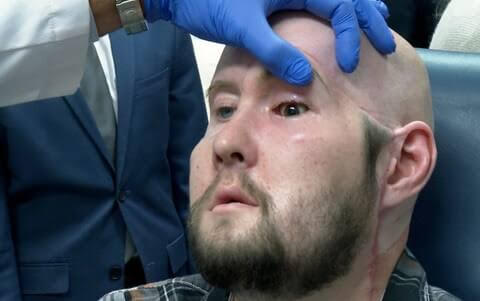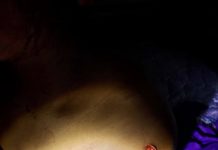Surgeons in New York say they have performed the world’s first complete eye transplant on a man, although it is not certain he will regain vision.
Who is the man with the world’s FIRST eye transplant?
Aaron James, who survived a high-voltage electrical accident, underwent 21 hours of surgery that replaced half of his face.
Surgeons have been able to transplant corneas successfully for years.
Experts have called the breakthrough a pivotal moment in the quest to restore sight to millions of people.
How surgeons performed the world’s first eye transplant?
Mr James, a high-voltage utility line worker from Arkansas, lost most of his face when it accidentally touched a 7,200-volt live wire in 2021.
On 27 May this year, he underwent a rare partial face transplant in addition to the eye transplant – which involved more than 140 healthcare professionals.

Surgeons at NYU Langone Health, who performed the complicated surgery, said on Thursday that Mr James, 46, was recovering well from the dual transplant and the donated eye looked remarkably healthy. His right eye still works.
‘The mere fact that we’ve accomplished the first successful whole-eye transplant with a face is a tremendous feat many have long thought was not possible,’ said Dr Eduardo Rodriguez, one of the leading surgeons on the team.

‘We’ve made one major step forward and have paved the way for the next chapter to restore vision.’
What surgeons say
Doctors say James’ surgery offers scientists an unprecedented window into how the human eye tries to heal.
‘We’re not claiming that we are going to restore sight,’ Dr Rodriguez told ABC News. ‘But there’s no doubt in my mind we are one step closer.’
Doctors said there was direct blood flow to the retina – the part of the eye that sends images to the brain. While there is no certainty Mr James will regain vision in his new eye, doctors do not rule out the possibility either.
‘If I can see out of it, that’s great,’ Mr James said in an interview. ‘But if it’ll kick-start the next path in the medical field, then I’m all for it.’
Mr James, a military veteran, will continue to be monitored by doctors, but the progress they have seen with the eye is ‘exceptional’ says Bruce E. Gelb, MD, a transplant surgeon at New York University.












